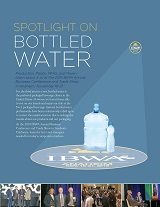A recent article in the Atlanta Journal-Constitution addresses aquifer and well depletion in Fannin County, Georgia. Unfortunately, blame is placed on the shoulders of the bottled water componaies that do honest business in the county.
A focus on bottled water singles out the bottled water industry from among the thousands of industrial water users. This scrutiny does nothing to protect and preserve renewable groundwater resources, nor does it help to arrive at an effective water policy.
Of note in the story:
Fannin County Commission Chairman Howie Bruce said complaints about dry wells and springs don’t seem to be concentrated around the water companies. But no one has mapped them.
“It’s spotted and sporadic, and it’s not something we can tie a direct cause to,” he said.
Furthermore:
The companies don’t draw enough to need permits that would subject them to greater state control.
And to add to that: Scientific studies show that the bottled water industry uses only 2/100 of 1 percent of the total groundwater withdrawals in the U.S. Consider, however, the billions of gallons of water used for other industrial, agricultural or commercial businesses. This comes from Bottled Water Production in the United States: How Much Ground Water is Actually Being Used?” from the Drinking Water Research Foundation.
There is a gross misunderstanding in the story as well related to the costs incurred by bottled water companies:
Five spring water bottlers or suppliers have set up shop in Fannin near the Tennessee border, perhaps more than in any other Georgia county. The companies pay nothing for the millions of gallons they draw and sell.
Groundwater resources and usage are not “free” to the bottled water industry.
Significant costs are incurred by bottlers to develop, protect and sustain water sources and the surrounding environment. On top of this, bottled water producers employ costly technologies and other measures to help ensure the product’s consistent quality, safety, good taste and convenience.
Much of the AJC’s article focuses on speculation that bottled water companies are depleting Fannin’s aquifers, despite the fact that there is no data to demonstrate such an event.
The bottled water industry is dwarfed by other commercial uses that often return the water to the environment in a polluted form. The article focused narrow attention on the bottled water industry whose groundwater usage is equivalent to a drop in the bucket compared to other industries.
As both a matter of civic responsibility and smart business sense, bottled water companies utilize all scientific and technological means available to protect and sustain source waters. Across the U.S., bottlers work closely with state and local authorities to site and develop bottled water sources to help ensure withdrawals do not have a negative impact on the source or nearby water resources.
This is achieved through intensive hydrogeological testing and monitoring prior to the permitting and operation of a site and great care, stewardship and continued monitoring of the water source, including those utilized by the surrounding community. Bottlers aren’t irresponsible consumers of our groundwater. Far from it.
From the point of view of the International Bottled Water Association – whcih was not quoted in the story – water management policies must be comprehensive, science-based, consider current uses and future needs, treat all water users equitably, and be multi-jurisdictional.
To conclude, it is evident that there is a need for more and better data on the aquifers in Fannin County, the state of Georgia, and the rest of the America in order to assist state authorities in managing available water resources. But unless we are ready to declare that all products that use groundwater as an ingredient or in production are abusing water resources, a focus on the bottled water industry is misguided and just plain wrong.



























